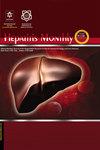Immune Score-based Molecular Subtypes and Signature Associated with Clinical Outcome in Hepatoblastoma
IF 0.6
4区 医学
Q4 GASTROENTEROLOGY & HEPATOLOGY
引用次数: 0
Abstract
Background: This study aimed to identify genes related to the immune score of hepatoblastoma, examine the characteristics of the immune microenvironment of hepatoblastoma, and construct a risk scoring system for predicting the prognosis of hepatoblastoma. Methods: Through using the gene chip data of patients with hepatoblastoma with survival data in the ArrayExpress and GEO databases, the immune score of hepatoblastoma was calculated by the ESITIMATE algorithm, and the prognostic value of immune score in patients with hepatoblastoma was studied by the survival analysis. Genes related to the immune score were identified by the WGCNA algorithm. According to these genes, patients with hepatoblastoma were clustered unsupervised. Finally, the risk scoring system was constructed according to the immune score-related genes. Results: The immune score calculated by the ESTIMATE algorithm had a good prognostic value in patients with hepatoblastoma. Patients with high immune scores had better OS than those with low immune scores (P < 0.001). A total of 146 immune score-related genes were identified by WGCNA analysis, and univariate COX regression analysis indicated that 59 of the genes had prognostic value. According to the unsupervised clustering results of the 146 immune score-related genes, patients with hepatoblastoma could be divided into two subtypes with different prognoses, namely molecular subtype 1 and subtype 2, with molecular subtype 1 having a better prognosis. The immunocyte infiltration analysis results showed that the difference between the two subtypes was mainly in activated CD4 T cells, activated dendritic cells, CD56 bright natural killer cells, the macrophage, and regulatory T cells. According to the immune score-related genes, a risk scoring system was constructed based on a five-gene signature. After the cut-off value was determined, patients with hepatoblastoma were divided into a high-risk group and a low-risk group. The prognosis of the two groups was different. Conclusions: The immune score has a good prognostic value in patients with hepatoblastoma. Based on the different expression patterns of immune score-related genes, hepatoblastoma can be divided into two different prognostic molecular subtypes, showing different immunocyte infiltration patterns. The established risk scoring system based on a five-gene signature has a good predictive value in patients with hepatoblastoma.肝母细胞瘤中基于免疫评分的分子亚型和特征与临床结果相关
背景:本研究旨在鉴定与肝母细胞瘤免疫评分相关的基因,检测肝母细胞癌免疫微环境的特征,构建预测肝母细胞细胞瘤预后的风险评分系统。方法:将肝母细胞瘤患者的基因芯片数据与ArrayExpress和GEO数据库中的生存数据相结合,采用ESITIMATE算法计算肝母细胞细胞瘤的免疫评分,并通过生存分析研究免疫评分对肝母细胞癌患者的预后价值。通过WGCNA算法鉴定与免疫评分相关的基因。根据这些基因,肝母细胞瘤患者在无监督的情况下进行聚类。最后,根据免疫评分相关基因构建了风险评分系统。结果:估计算法计算的免疫评分对肝母细胞瘤患者具有良好的预后价值。免疫评分高的患者OS优于免疫评分低的患者(P<0.001)。WGCNA分析共鉴定出146个免疫评分相关基因,单因素COX回归分析表明,其中59个基因具有预后价值。根据146个免疫评分相关基因的无监督聚类结果,肝母细胞瘤患者可分为两种预后不同的亚型,即分子亚型1和分子亚型2,其中分子亚型的预后较好。免疫细胞浸润分析结果显示,两种亚型的差异主要表现在活化的CD4 T细胞、活化的树突状细胞、CD56明亮的自然杀伤细胞、巨噬细胞和调节性T细胞。根据免疫评分相关基因,构建了基于五个基因特征的风险评分系统。在确定临界值后,将肝母细胞瘤患者分为高危组和低危组。两组患者的预后不同。结论:免疫评分对肝母细胞瘤患者具有良好的预后价值。根据免疫评分相关基因的不同表达模式,肝母细胞瘤可分为两种不同的预后分子亚型,表现出不同的免疫细胞浸润模式。建立的基于五基因特征的风险评分系统对肝母细胞瘤患者具有良好的预测价值。
本文章由计算机程序翻译,如有差异,请以英文原文为准。
求助全文
约1分钟内获得全文
求助全文
来源期刊

Hepatitis Monthly
医学-胃肠肝病学
CiteScore
1.50
自引率
0.00%
发文量
31
审稿时长
3 months
期刊介绍:
Hepatitis Monthly is a clinical journal which is informative to all practitioners like gastroenterologists, hepatologists and infectious disease specialists and internists. This authoritative clinical journal was founded by Professor Seyed-Moayed Alavian in 2002. The Journal context is devoted to the particular compilation of the latest worldwide and interdisciplinary approach and findings including original manuscripts, meta-analyses and reviews, health economic papers, debates and consensus statements of the clinical relevance of hepatological field especially liver diseases. In addition, consensus evidential reports not only highlight the new observations, original research, and results accompanied by innovative treatments and all the other relevant topics but also include highlighting disease mechanisms or important clinical observations and letters on articles published in the journal.
 求助内容:
求助内容: 应助结果提醒方式:
应助结果提醒方式:


